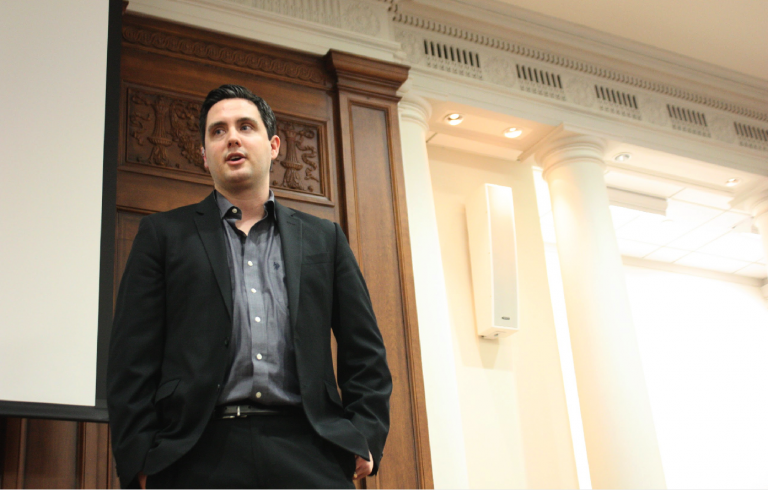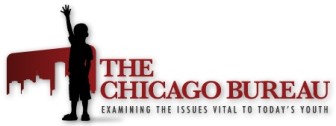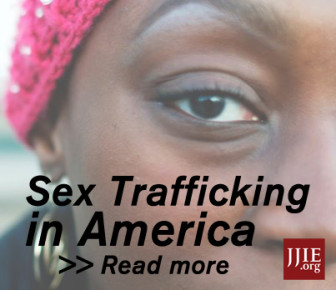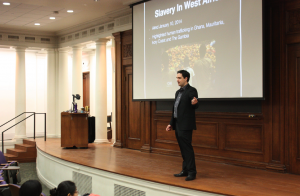
Maytal Mark / The Chicago Bureau
CNN's Leif Coorlim, who has traveled to many areas around the globe to report on human trafficking, a modern form of slavery that is not exempt from the U.S.
CHICAGO — The Federal Bureau of Investigation estimates that there are 300,000 child prostitutes in the United States. The Department of Justice estimated in 2004 that between 14,500 and 17,500 foreign nationals are trafficked into the U.S. every year, and ranked Chicago as one of the top 20 most intense trafficking jurisdictions in the country.
Reporter Leif Coorlim traveled to Cambodia, Haiti and the Philippines to document the stories of victims of human trafficking – including girls as young as 12 who had been coerced into sex work – who remain trapped by debt and the threat of violence.
 “We have more stories than we could ever tell,” Coorlim said told a crowd at Northwestern University recently, referencing the estimated 20 million to 30 million slaves working worldwide today.
“We have more stories than we could ever tell,” Coorlim said told a crowd at Northwestern University recently, referencing the estimated 20 million to 30 million slaves working worldwide today.
CNN’s Freedom Project, which began in March of 2011 and was only intended to run for a year, has now produced 350 stories and is entering its third year, in an effort to use documentary storytelling as a tool to end modern-day slavery.
“We’re limited in what we can do, because we don’t go out and rescue anybody, we don’t bring in celebrities for huge telethons,” Coorlim said. “But we do have a megaphone and we can keep hammering on the table until someone responds.”
- Coorlim said that the project’s documentaries have spurred legislative reform in places like Cambodia and Taiwan, and has helped humanitarian organizations be created or expanded in other countries.
 “A lot of times we’re embarrassing the countries by telling these stories,” Coorlim said. “It’s a type of public shaming to be put on the international stage, and they usually want to remedy the problem.”
“A lot of times we’re embarrassing the countries by telling these stories,” Coorlim said. “It’s a type of public shaming to be put on the international stage, and they usually want to remedy the problem.”
Take his trip to Cambodia, where Coorlim’s team went undercover as customers in the Paris Hotel brothel and videotaped a solicitation for sex using hidden cameras; the footage was then used to launch a police investigation.
Some journalists, academics and others would question the use of the undercover technique, but CNN’s use of the method, according to Coorlim, was the best – if not – only way to get at story that is so rumored, or even known second-hand, but rarely seen so up-close.

Maytal Mark / The Chicago Bureau
Leif Coorlim, who has traveled broadly to report on human trafficking in a program started by CNN that was supposed to last only a year but was continued due to the impact of the show.
“Sadly, it’s difficult to be an undercover journalist everywhere except in sex trafficking” Coorlim said. “[As a white guy,] I fit right in.”
The Freedom Project’s coverage of cocoa workers in West Africa spurred chocolate companies to change their practices, and their documentary following a Filipino activist who has rescued more than 15,000 young women from traffickers spurred a national anti-trafficking movement in the Philippines, he said.
While Coorlim maintained that there isn’t “another side” to the problem of modern-day slavery, he emphasized the dire situation most traffickers are in.
“Not all of these traffickers are evil people; some of them are just trying to survive,” Coorlim said, giving an example of a West African cocoa farmer who was as poor as the slave workers he didn’t pay. “Often it’s someone screwing someone else over to get ahead.”
In a Q&A with the crowed, Coorlim also addressed the challenges inherent in interviewing victims of trafficking.
“What we struggle with is telling what happened without re-victimizing the person,” Coorlim said. “We never ask twice.”
Of the students who attended, some were drawn by CNN’s big name and others for more personal reasons.
“It’s an issue that’s close to home,” Northwestern sophomore Jodie Chan said. “I was born and raised in Hong Kong, and I’ve been to those restaurants and bars that are right next to strip clubs. It’s an issue I want to learn more about.”
Coorlim was hosted by Fight for Freedom, Northwestern’s anti-trafficking student organization, and sponsored by the Buffet Center and the Center for Forced Migration Studies.
This story was produced by The Chicago Bureau.